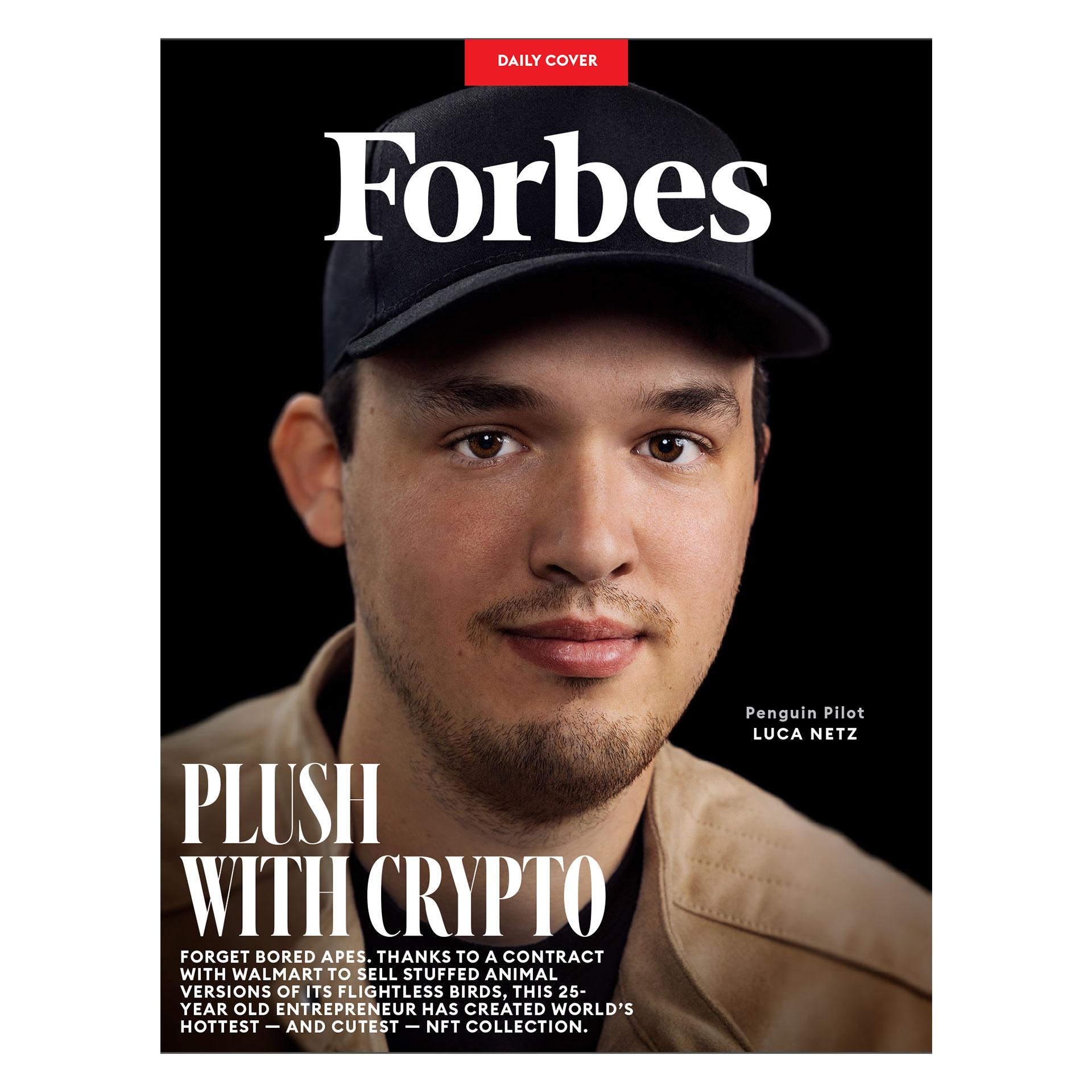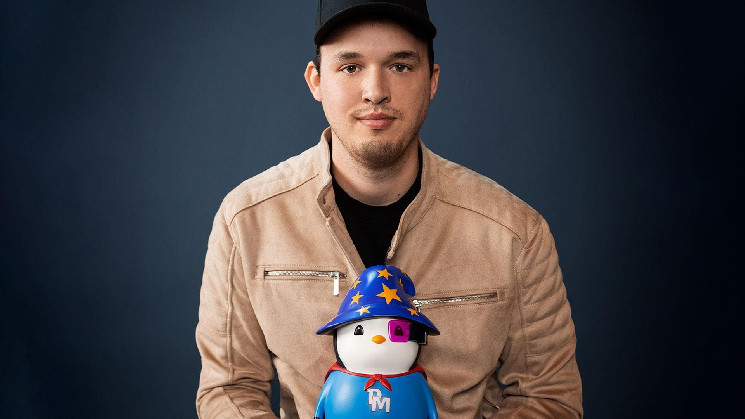Move over bored monkeys. Thanks to a contract with Walmart to sell plush versions of its adorable waterfowl, The Igloo Co is home to the world’s most popular NFT collection.
By means of Maria Gracia Santillana LinaresForbes staff
aisland 17 at the Walmart Supercenter in North Bergen, New Jersey, is one of a half-dozen dedicated to children’s toys and games. The Christmas season is long over, but one item is still flying off the shelves, despite the fact that the birds depicted by the cartoonish cuddly toys and plastic figures in the boxes cannot fly. Adorable stuffed animals known as Pudgy Penguins are selling fast at more than 3,000 Walmarts, as well as on Amazon.com and Ebay. For example, Polar Pete is an 8-inch yellow penguin holding a carrot and wearing a white sweater decorated with a polar bear’s face. Cowboy Carl is a 4-inch penguin wearing black sunglasses and a tall cowboy hat who looks like he’s ready to make friends.
The plush penguins are actually physical versions of non-fungible tokens (NFTs), digital collectibles, now selling on crypto marketplaces for as much as $500,000 each. These adorable toy counterparts to the virtual world collectibles retail for $8 to $30. They’re a big reason why upstart NFT brand Pudgy Penguins and the company that sells them, Miami-based The Igloo Company, are now thriving , while NFT stalwarts like Bored Ape Yacht Club from Yuga Lab and Azuki from Chiru Labs languish.

According to Dapp Radar, NFT trading volume fell by more than 50% to $12.6 billion in 2023. Bottom prices for profile photo collections such as Bored Ape Yacht Club, Doodle and Azuki fell by almost 60%. In contrast, virtual world prices paid for Pudgy Penguins NFTs have more than doubled. Today, the total market value of Pudgy Penguin NFTs exceeds $400 million, and the cheapest virtual penguin sells for $45,000.
Llaunched in July 2021, Pudgy Penguins is the creation of four college friends who decided to join in on the NFT mania. Just a few months after graphic artist Beeple sold a collection of NFTs at Christie’s auction house for $69 million, the computer-savvy quartet generated 8,888 Pudgy Penguins images, which were then minted as NFTs at a price of about $0.03 cents each. Their collection sold out in 20 minutes for about $90 each, netting them more than $800,000. Unlike other popular NFT collections of the time, whose avatars were often pixelated, sharp, or even grotesque, Pudgy Penguins were characterized by their vibrant colors, small beaks, and cute round faces.
Pudgy Penguin’s was so successful that shortly after the debut of the first collection, the founders launched 22,222 editions of Lil Pudgy’s, smaller versions of the original collection. Their success was short-lived. NFT prices started to fall with the crypto market in late 2021, and to make matters worse, the community of Pudgy Penguin owners became disillusioned with how the founding team managed the collection. Led by University of Central Florida student Cole Villemain, the founding team had made grand promises about releasing a children’s book and a chubby penguin game, with no timeline of when these would become reality. Their penguins were even briefly delisted by NFT marketplace OpenSea. It all came to a head when Villemain hinted at a big drop in December 2021: while many holders speculated it would be the virtual game, they were disappointed to discover it was just a fishing rod accessory for the penguins. By Christmas Day 2021, Pudgy Penguin prices had fallen from a post-launch high of 2.7 eth (about $10,200) to 0.55 eth, about $2,330 at the time.
“We were inexperienced students,” says Villemain. “We couldn’t do the things we wanted to do.”
Take serial entrepreneur Luca Schnetzler, then a 23-year-old high school dropout known online as Luca Netz, who had built a track record of helping influencers capitalize on their fame by selling branded merchandise, mainly T-shirts and hats. His clients include musician Kendrick Lamar, influencer brothers Jake and Logan Paul and TikTok collective The Hype House. Netz also managed to get influencers to sell costume jewelry he bought on AliExpress. At 18, Netz claims he was already a self-made millionaire, and by his early twenties he was Chief Marketing Officer at clothing company Von Dutch and NERF competitor Gelblaster.
PENGUINS THAT RISE
Prices of Pudgy Penguin NFTs have increased nearly tenfold since March 2023, turning a $10,000 purchase into $105,000. Bitwise’s Blue-Chip NFT Index Fund, consisting of the 10 best-selling NFTs, rose just 12%.
Netz saw great potential in the languishing Pudgy Penguin NFT brand. After purchasing his own Pudgy Penguin NFT, he immersed himself in the Pudgy Penguin online community and after months of negotiating a deal, purchased the copyright and original creator addresses (where royalties were accrued) of Pudgy Penguins in April 2022 for $2 .5 million. His strategy was simple: build trust with Penguin holders, deliver on some of the promised projects, such as video games and books, and expand the companies’ revenue streams, especially in the physical world.
“There are very few times in your life when you have the opportunity to shape the future,” says Netz, now 25. “This was my chance to do that.”
One of the first things Netz did was secure financing for his Pudgy Penguin reboot. He reached out to venture funds and reached out to crypto investors before ultimately closing a $9 million seed round led by crypto firm 1kx Capital the week FTX collapsed in November 2022.
Strategically, Netz decided that Pudgy Penguins would be less dependent on royalties than most NFT companies. One of the biggest draws for artists and companies like Yuga Labs that create NFT collections has always been the ability to get a 5-10% cut on every secondary sale, meaning the founders and creators have a steady stream of income received from the billions in trading activities. activity. But this idealistic system has run into problems: Royalties are not automatically applied to payments, so enforcing these fees fell under the responsibility of NFT marketplaces. As crypto and NFT prices and volume dropped in 2022, marketplaces began cutting fees to stay competitive. Royalties were the first thing to go.
According to crypto data research firm Nansen, Pudgy Penguins has only generated $8 million in royalties since its inception. “Royalties are not sustainable,” says Netz. “You have no control over airwaves prices and you have no control over whether marketplaces will enforce royalties.” Since inception, Yuga Labs has generated $59 million from Bored Apes and Chiru Labs has made $43 million from its Azuki NFTs, but over the past year their royalties have fallen sharply.
Netz then went to work building the Pudgy Penguin brand outside of the NFT enclaves. Posting adorable animations of colorful Pudgy Penguins experiencing everyday hardships of Gen Z, like taking a good selfie or going through skincare routines, the Pudgy Penguin NFT Collection amassed a total of 1.3 million followers on Instagram and nearly nine million views on TikTok, where Netz was able to monetize the content as part of the platform’s Creator Fund.
Perhaps the most unexpected Netz innovation is Pudgy Penguin’s presence on Giphy, a meme-making platform where brands can create short comment snippets that are sent via iMessage, WhatsApp and other texting platforms. Pudgy Penguin’s account has 16.6 billion views, better than Disney’s 16 billion.
“The goal is to make Pudgy the most recognizable brand in the world, how that happens doesn’t really matter,” said Peter Pan, partner at 1kx Capital, lead investor of The Igloo Company’s seed round.
Then came the retail push. Netz’s plan included a full merchandise line, from hats and pins and stickers to stuffed animals and plastic figurines, and could partner with Israel’s PMI Toys for production and merchandising. In May 2023, the first drop of physical goods sold out on Amazon within 48 hours, bringing in $500,000 in sales, according to the company. Netz was then able to secure distribution in retailers like Five Below and Macy’s. Finally, in September 2023, Netz landed Walmart, giving Pudgy Penguins a retail launch of over 2,000 stores. To date, the company has sold more than one million toys through its retail partners, generating $10 million in revenue. Walmart has announced a new season, with 1,100 additional stores, and Pudgy Penguins will be available at Target in April. According to Omer Dekel, CEO of Pudgy’s manufacturer, an exclusive Pudge Penguins could be coming to Walgreens soon.
As merchandise started flying off store shelves, NFT prices skyrocketed. Since Walmart launched, the floor price of Pudgy Penguin NFTs has risen from 4.2 eth to a recent high of 20 eth, or about $58,000. All told, there have been more than $800 million in Pudgy Penguin NFT sales since Netz took over in 2022.
Juan Leon, senior crypto research analyst at Bitwise Investments of Pudgy’s, says: “They were nothing short of a masterclass in brand building.”
Ono big driver behind Pudgy Penguin’s NFT success is its approach to sharing royalties from physical toys and stuffed animals with current owners of digital collectibles.
Because NFT holders actually own the intellectual property of their unique Pudgy Penguin, they will receive a royalty based on sales of associated physical versions of their non-fungible token. Essentially, Netz’ Igloo Company licenses the rights of the holders of the corresponding NFTs. As a result, the lucky owners of popular Walmart Pudgy Penguins earn a 5% royalty on net revenue. To date, nearly 130 NFTs have been licensed for physical products.
To get a license, Pudgy Penguin NFT holders submit their NFT to a pool of potential characters in the Igloo Company’s internal Overpass IP platform. The company can then choose to use them for their next toy, book or even upcoming game. Take, for example, Pudgy Man Plushie, a penguin wearing a superhero costume and reflective sunglasses. You can purchase the toy from Pudgy Penguin’s website for $29.99 or from several other online toy stores. In January, someone paid $110,000 for his NFT and as a result, a small portion of the sales of this popular plush toy will go to the new owner.
Netz’s real-world royalty program for NFT owners isn’t the first. Bored Ape Yacht Club and Crypto Punk NFT holders have intellectual property rights to their images, giving owners the right to license them. A small number of products – including clothing, hot sauces and even cannabis companies – have used Bored Ape and Crypto Punk imagery, but sales have been limited.
However, Luca Netz’s cute penguins seem to be a reverse game changer. It proves that embracing an NFT is not only possible, but profitable.

